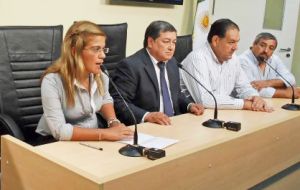MercoPress. South Atlantic News Agency
Falklands: optimism about identification of the unknown Argentine soldiers
 Hector Ortega (Second from L) head of the Chaco delegation that met with representatives from the Falklands elected government
Hector Ortega (Second from L) head of the Chaco delegation that met with representatives from the Falklands elected government An Argentine delegation involved in human rights that in early May visited the Falkland Islands is optimistic about the possibility of advancing in the identification of the remains of Argentine soldiers buried as unknown in unmarked graves at the Darwin cemetery.
“Despite some objections from the Islands’ authorities we trust that next summer the identification process can get started” said Hector Ortega from the Human Rights Secretariat of the Argentine province of Chaco, to the north of the country.
Ortega and a small party of Chaco officials and Malvinas veterans recently visited the Falklands and formally requested the Islands Legislative Assembly to have a meeting to address the issue. Falklands’ lawmakers accepted and attended the meeting to listen what the visiting delegation had to say.
Of the 238 graves in the Argentine cemetery in Darwin, 123 have no names. The issue of identifying the remains is not new and is not unanimous among the relatives of the soldiers killed during the 1982 conflict.
“I think we can continue to advance along the path to the restitution of identities and I believe this will finally go ahead. Most probably at the Darwin cemetery, I’m very optimistic about it”, said Ortega.
“The meeting with the local authorities was very positive because of the very amiable environment. They accept the task to be done by the International Red Cross and understand the need for the Argentine mothers to know where their children are buried”, pointed out Ortega.
However the Falklands lawmakers put an only small condition: “that 100% of all relatives agree, unknowing how the law system works in our country”.
There were other points addressed at the meeting, one of them referred to witnesses of torture incidents committed by Argentine military officers against their own soldiers, but “this was left to the people to decide”
“They said it was a matter for those who want to step forward and give their witness testimonies. As government and as elected representatives of the Islanders they will not get involved in this issue. They were very diplomatic and don’t want to get involved in an internal problem of Argentina, and we know it is very difficult that an Islander would want to get involved. Nevertheless we have two people that can be witnesses”, said the Chaco provincial government head of human rights secretariat.
Ortega added that he felt that the Islands government representatives were not totally aware as to how negotiations through the International Red Cross had been advancing “since the organization did not ask for 100% of next of kin approvals but a significant percentage”.
Since President Cristina Fernandez announced on April 2 that already 91 relatives had adhered to the proposal and of that number, 44 had been analyzed, studied and visited by the Human Rights Secretariat from Chaco in the whole of the north of Argentina, “this is a more than important, significant number to go ahead with the identification process in the Darwin cemetery”, concluded Ortega.





Top Comments
Disclaimer & comment rules-

-

-

Read all commentsHold the front page ..... An Argentinian that actually accepts that the islanders exist and that they have a government AND that they do not want to get involved in Argentinian internal affairs.... he is bound to win a one way ticket to a government sponsored parachute jump, without the parachute...
May 21st, 2013 - 07:48 am 0So - the Falklanders have 'authorities” :-)
May 21st, 2013 - 10:58 am 0The bodies are being used for political purposes by the argentine government - they should be returned to argentina for identification and reburial.
May 21st, 2013 - 11:11 am 0Commenting for this story is now closed.
If you have a Facebook account, become a fan and comment on our Facebook Page!